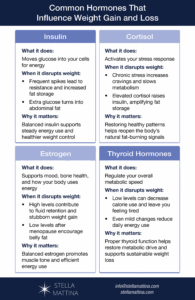
Does weight loss feel like a puzzle with missing pieces? You eat well, you stay active, but the results stall? The hidden puzzle piece is often something invisible: your hormones.
Think of these as your body’s chemical messengers – your built-in communication system. Hormones carry signals that control your metabolism, including hunger and mood, and also how efficiently your cells burn energy or store fat.
In other words, your hormones play a role in how you gain, lose, and maintain body weight.
When their messages are clear and balanced, your metabolism runs smoothly. When signals are messy, your metabolism slows and your body starts protecting its energy stores instead of releasing them.
That’s why you can keep the same routine, calories, and workouts as before and still see no progress. Hormonal imbalance can shift the entire equation – altering your appetite cues, slowing your energy burn, or encouraging fat storage.
When you know that hormones regulate metabolism, you understand why “eat less, move more” isn’t always enough!
In this article, we’ll look at how key hormones interact, what throws them off balance, and how restoring hormonal health can open the door to lasting weight loss.
Table of contents
What Are Weight Loss Hormones?
How Hormones Affect Fat Storage and Metabolism
Common Hormones That Influence Weight Gain and Loss
Signs You Have a Hormonal Imbalance
How Does Fat Affect Hormones?
How to Fix Hormonal Imbalance for Healthy Weight Loss
What Are Weight Loss Hormones?
As mentioned, hormones are your body’s chemical messengers – tiny molecules that move through your bloodstream, delivering instructions from one organ to another.
Within your endocrine system (a.k.a. your hormone system), dozens of these messengers shape how you feel, function, and respond to daily habits.
A hormone produced in one part of your body can influence tissues far away, adjusting energy use, appetite, and mood in milliseconds.
When it comes to maintaining or changing your body composition (which is what you’re aiming to do), a handful of hormones carry particular influence.
They include insulin, cortisol, estrogen, leptin, ghrelin, thyroid hormones, and testosterone. Together these coordinate hunger, fat storage, and how efficiently your cells turn food into usable energy.
Why are these called weight loss hormones?
Because if hormone levels drift too high or too low, the conversation between them becomes distorted! You might feel hungry when you’re actually full, or sluggish when you’ve slept well.
These are early signs of hormone imbalance – signals that your body’s internal communication may need looking at.
Balanced hormones support healthy weight management because they align your body’s natural metabolic rhythms.
How Hormones Affect Fat Storage and Metabolism
Hormones determine how your body uses, stores, or releases energy.
Inside this chemical network of hormones, certain messengers decide when to burn fuel and when to hold on to it as body fat.
Insulin, for example, helps move glucose from the bloodstream into your cells for energy. But when your cells stop responding properly – a state known as insulin resistance – your body compensates by releasing more insulin to try to regulate blood sugar levels. But lack of insulin sensitivity encourages fat storage rather than fat burning.
Cortisol, your body’s main stress signal, works in a similar way. Chronically high cortisol levels raise blood sugar and cravings, particularly for refined carbohydrates, which then feed the insulin cycle again.
Can it get worse? Yes!
Thyroid hormones regulate your metabolic “speed.” Even a subtle decline can reduce how much daily energy you actually use up, leaving you tired and prone to storing body fat.
Estrogen and testosterone influence where that fat sits – often shifting toward your abdomen when hormonal imbalance sets in.
Leptin and ghrelin work to regulate your appetite (leptin) or stimulate hunger (ghrelin – the hunger hormone!). You need them to work well. If your leptin levels get out of sync, leptin resistance sets in, making it hard to lose weight.
Of course, external factors (such as stress, poor sleep, nutrient-poor diets, and age-related changes) can increase the effects of hormone imbalance.
When that happens, your metabolism becomes even less predictable and your appetite cues less reliable. It then becomes harder to lose weight even when your lifestyle habits seem sound!
Can hormones cause weight gain and fatigue? Yes, certain imbalances like thyroid dysfunction or insulin resistance can lead to both.
Recognizing how interconnected these hormone pathways are is the first step toward identifying which hormone might be holding your progress back.
Common Hormones That Influence Weight Gain and Loss
Let’s look more closely at four of the common weight loss hormones.
Insulin – the Fat-Storage Hormone
Insulin’s job is simple but powerful: it helps your body move glucose into cells for energy. When your diet is balanced and your insulin sensitivity is good, you use energy efficiently and your body fat stays stable.
But frequent spikes in insulin – often from ultra-processed foods or constant snacking – can cause cells to stop responding. That’s insulin resistance, and it’s your body’s signal to store rather than burn fat. So, it converts extra glucose into body fat, especially around your abdomen.
This process links directly to weight gain and, over time, to metabolic syndrome and fatigue. However, restoring insulin balance through medical guidance and a nutrient-dense diet can help your body relearn how to lose weight effectively.
Cortisol – the Stress Hormone
Cortisol is your built-in alarm system. The stress hormone rises when life feels dangerous. Short bursts of stress keep you alert. But when cortisol levels stay high, your body interprets stress as danger and clings to its energy reserves.
That means more food cravings, slower metabolism, and central weight gain. Elevated cortisol also raises insulin, again increasing fat storage.
So, can your hormones stop you from losing weight? Yes – when cortisol and insulin remain high together, fat-burning signals get silenced.
You can help reopen the pathway to healthy weight loss by managing stress and restoring healthy cortisol patterns.
Estrogen – the Female Hormone and the Weight Gain Connection
Estrogen helps regulate your mood, bone density, and how your body stores fat. When estrogen is balanced, it protects muscle tone and supports metabolic efficiency – which is what we’re looking for to help correct hormone imbalance.
Problems arise when estrogen levels swing too high or too low.
“Estrogen dominance” is often a result of stress, environmental toxins, or excess body fat. It can lead to stubborn weight gain, fluid retention, and mood shifts.
On the other hand, low estrogen (or estrogen deficiency) after menopause can make postmenopausal women more prone to belly fat and reduced energy use.
In both cases, these hormonal shifts in your endocrine system reduce calorie burn and can make it harder to lose weight, even with good habits.
Thyroid Hormones – the Metabolic Regulators
Your thyroid gland releases thyroid hormones that act like a thermostat for your metabolism. When levels fall, your metabolism slows, causing fatigue, dry skin, and weight gain that resists weight loss effort.
A mild decline in thyroid hormone output can reduce energy expenditure by hundreds of calories a day! That’s why even your healthy diet sometimes isn’t enough.
As part of your medical weight-loss plan in Dallas, we suggest lab testing for thyroid function. If we find an imbalance, we can target your treatment and help re-ignite energy production so your body can lose weight sustainably.
Signs You Have a Hormonal Imbalance
Hormones affect every system in your body, so when they fall out of sync, and diet and exercise no longer work for weight loss, the signs can appear almost anywhere.
A subtle hormonal imbalance can develop gradually, often after stress, pregnancy, or perimenopause. And many people overlook the hormone connection.
So – if you’re thinking, “how do I know if hormones are affecting my weight?” typical symptoms include:
- Unexplained weight gain or sudden changes in body composition
- Fatigue that lingers even after a good night’s sleep
- Mood swings or brain fog
- Irregular cycles or hot flashes
- Cravings for sugar or carbs
- Difficulty falling or staying asleep
If several of these sound familiar, your hormone levels could be sending mixed signals.
One key clue: weight gain that resists diet and exercise. When you can’t seem to lose weight despite doing “everything right,” it’s often your hormones – especially, but not always, in postmenopausal women.
Recognizing these early patterns of persistent weight issues allows you to seek help before they spiral into long-term hormonal imbalance and metabolic fatigue.
But what role does fat play in the hormone connection?
How Does Fat Affect Hormones?
This is a two-way process: Hormonal imbalance influences body fat, and body fat influences hormone imbalance.
That’s because fat tissue is metabolically active. It releases signaling molecules that affect appetite, inflammation, and reproductive health.
One key messenger is leptin. When leptin levels rise, your brain should register that you’re full. But with excess body fat, those signals get muffled – a state called “leptin resistance.” Your brain thinks you’re starving, even when energy stores are high – which drives more eating and slows your metabolism.
Excess fat also alters hormone levels by producing small amounts of estrogen and reducing growth hormone, both of which change how your body stores and burns calories.
This is a vicious cycle! More fat means more hormonal disruption, and more disruption makes it harder to shed fat.
Breaking that fat loop through medical weight loss support will help your hormones find balance again.
How to Fix Hormonal Imbalance for Healthy Weight Loss
There’s no single shortcut to balancing hormones. But there are proven ways to help your body regulate its metabolism again.
Start small by managing your stress, prioritizing good sleep patterns, and following a healthy diet based on whole foods. Walking, strength work, and yoga can also encourage insulin sensitivity and steadier energy.
These steps won’t fix every hormonal imbalance, but they build a good foundation.
After that, it’s time to look at targeted medical treatment – by which we mean hormone replacement therapy.
Which hormone therapy is best for weight loss? We recommend bioidentical hormone replacement therapy (BHRT), because it works naturally with your body to provide a steady, customized release of hormones.
Our clinician will assess the possibility of hormone imbalance (depending on your age, symptoms, and possible period changes. And maybe then recommend BioTE pellet therapies to restore natural metabolism.
Options can include thyroid support to lose weight, testosterone balancing, or BHRT for women approaching or past menopause.
Under professional supervision, these therapies can support weight loss by rebalancing your hormone levels so your metabolism works with you.
How?
By restoring clarity to your body’s messaging system! BHRT addresses your hormonal imbalance directly. And the goal isn’t so much to lose weight as to be able to maintain a healthy body weight for you. This usually sorts out your other symptoms.
When to See a Weight Loss Doctor or Hormone Specialist
If you have persistent hormonal imbalance symptoms (see above) and your body seems resistant to weight loss or maintaining a healthy weight, it’s probably wise to consult a hormone and weight loss expert in Dallas.
They can develop a personalized plan with you that balances your body’s hormone imbalance and achieves lasting results when calorie counting fails.
The medical weight loss program at our Stella Mattina clinics takes a full-body view: hormone testing, nutritional guidance, and metabolic analysis working together to restore equilibrium.
Call us today – we offer same-day appointments.
How a Primary Care Doctor Dallas Helps You Achieve Hormonal Balance and Weight Loss
You’ll have realized by now that sustainable weight loss is often about stabilizing any hormonal imbalance that’s preventing your healthy habits working!
When your hormone levels are in sync, your body naturally finds its rhythm for appetite, sleep, and energy. But when they’re out of sync, it’s really hard to reach your target weight.
Not only that, but chronic hormonal imbalance can raise your risk of heart disease, fatigue, and emotional burnout. That’s why understanding the role of insulin, cortisol, estrogen, thyroid, and leptin matters so much.
If hormonal changes have made weight loss feel discouraging, medical weight loss in Dallas gives you a clear and encouraging path forward so you can finally see the progress you’ve been aiming for.
Take the first step toward feeling like yourself again.
Connect with a primary care doctor Dallas and choose the location that supports your next success.

Dr. Gonzalo Venegas
Gonzalo Venegas, MD is the Medical Director of Stella Mattina Health and a respected obstetrician-gynecologist with over four decades of service in the Dallas medical community. He has led the Department of Obstetrics and Gynecology at Methodist Dallas Medical Center and contributed to community health through his role on the Parkland Health & Hospital System Board. A dedicated mentor at UT Southwestern, Dr. Venegas is known for his leadership, compassion, and commitment to advancing women’s health and medical education.






